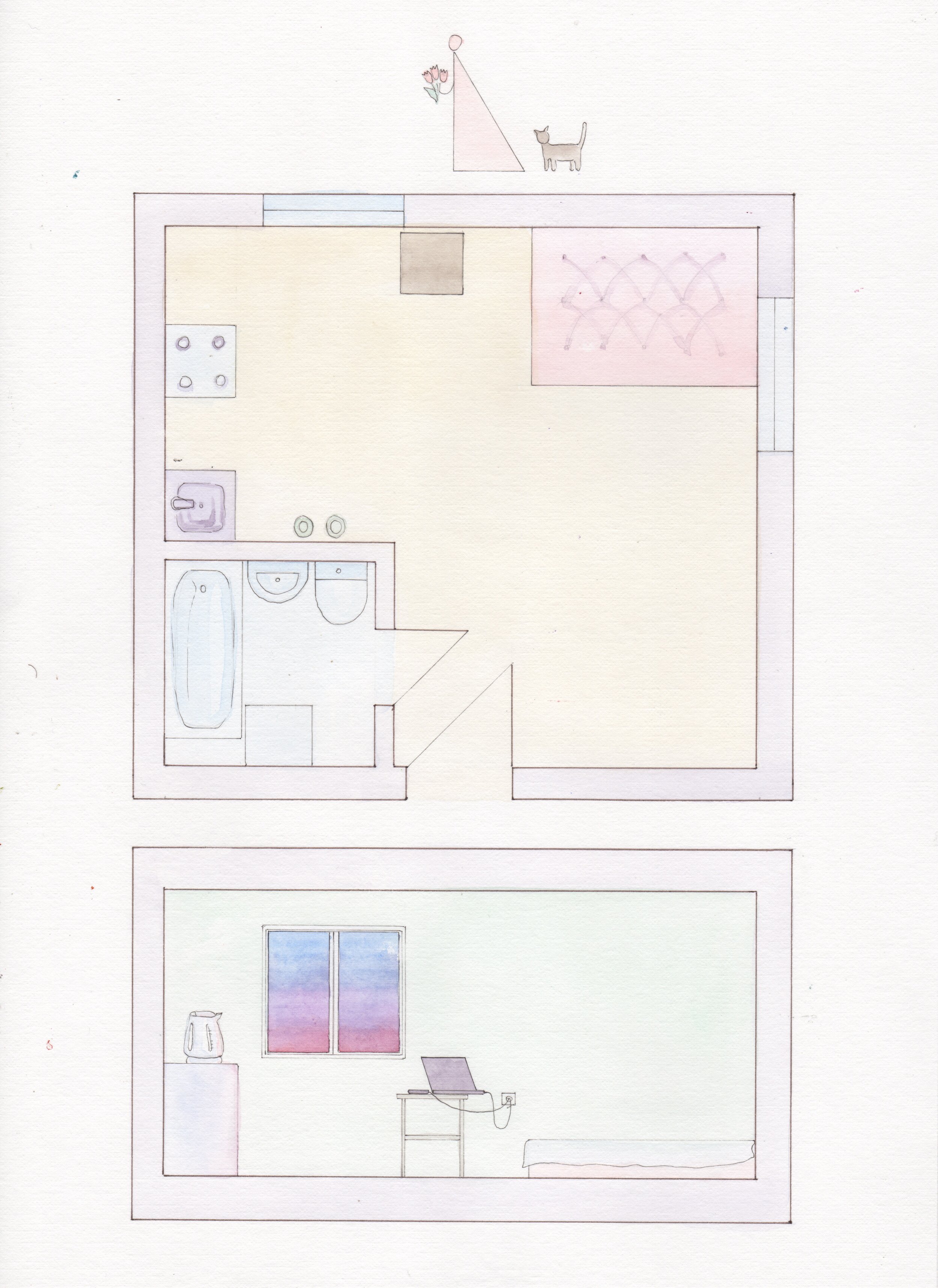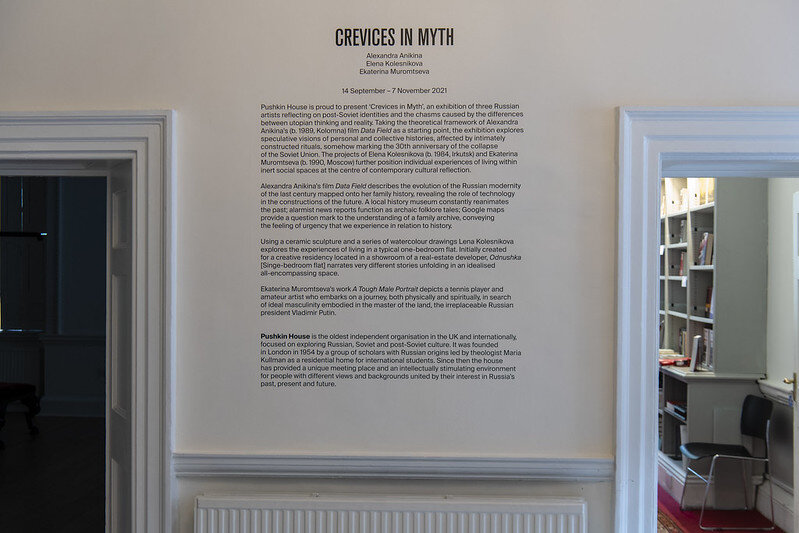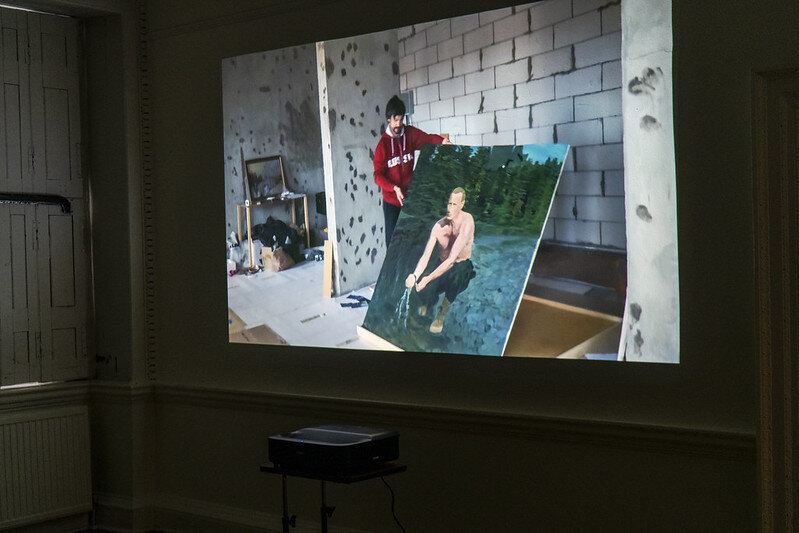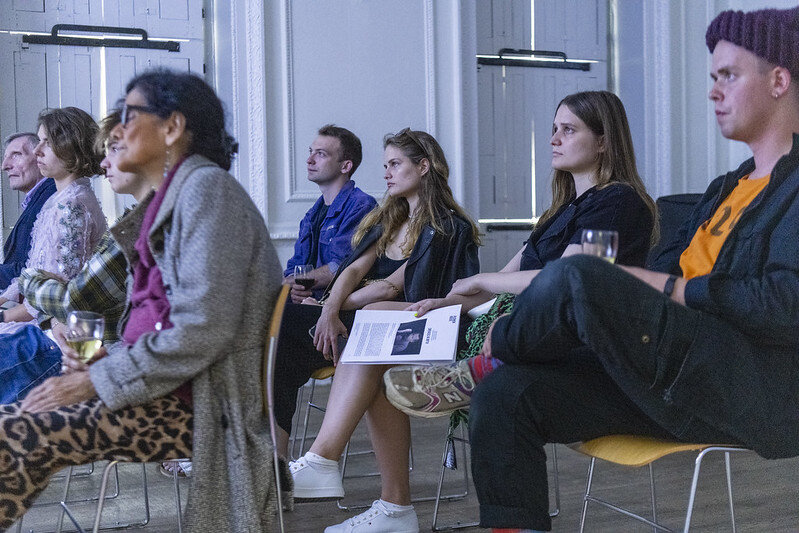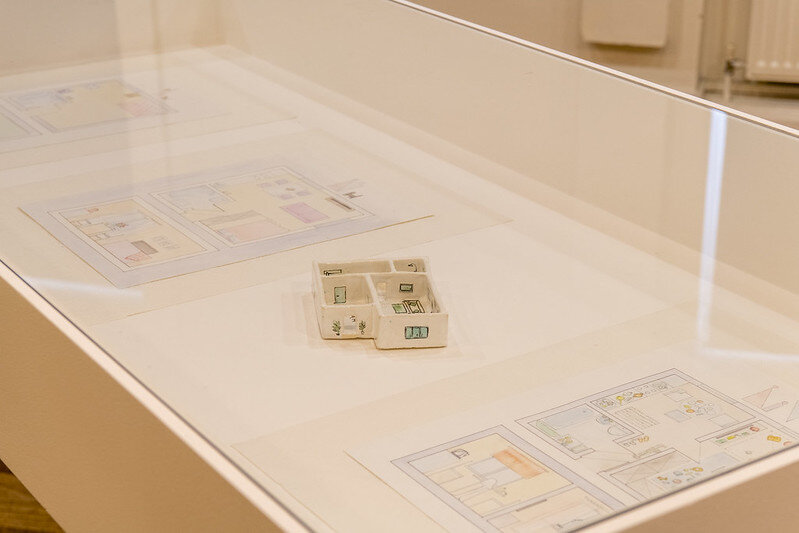Alexandra Anikina
Elena Kolesnikova
Ekaterina Muromtseva
Crevices in Myth
Ekaterina Muromtseva, A Tough Male Portrait, 2019, film still. Courtesy of the artist.
14 September – 7 November 2021
Open Tues-Sat 10-17 and Friday 10-21
Pushkin House is proud to present 'Crevices in Myth', an exhibition of three Russian artists reflecting on post-Soviet identities and the chasms caused by the differences between utopian thinking and reality. Taking the theoretical framework of Alexandra Anikina's (b. 1989, Kolomna) film Data Field as a starting point, the exhibition explores speculative visions of personal and collective histories, affected by intimately constructed rituals, somehow marking the 30th anniversary of the collapse of the Soviet Union. The projects of Elena Kolesnikova (b. 1984, Irkutsk) and Ekaterina Muromtseva (b.1990, Moscow) further position individual experiences of living within inert social spaces at the centre of contemporary cultural reflection.
Post-Soviet reality has inherited numerous grandiose narratives, beliefs and unresolved issues from its long and troublesome past. Those beliefs and desires condition the aspirations of people, naturally of those involved with political life and public thinking of any sort, but also, inevitably, of those who might just want to follow their private ambitions and would prefer to be left alone. History chases them and their families, making them live through recurrent distressing memories.
Economic crises and geopolitical gambles, cultural shifts and technological innovations constantly disrupt business-as-usual and interfere with the temporal linearity of individual lives. Those ruptures question, time and again, people's identities, reshuffle potential existential positions and make them both the victims and victors of history, vulnerable to unpredictable turbulence of all kinds.
The large utopian fantasies, lying at the foundation of these transformations—from nationalist dreams about maintaining international relevance to the technological utopianism of start-up culture—are all underpinned with eschatological hopes about some futuristic peaceful lives. They tend to disregard the daily experiences of most people, focusing instead on large-scale events, dramatic conflicts and exceptional destinies. What then happens to those affected but not involved, those who have to witness the illusion of continuous history and find their way around it?
Alexandra Anikina's recent film Data Field describes the evolution of the Russian modernity of the last century mapped onto her family history, revealing the role of technology in the constructions of the future. A local history museum constantly reanimates the past; alarmist news reports function as archaic folklore tales; Google maps provide a question mark to the understanding of a family archive, conveying the feeling of urgency that we experience in relation to history.
Using a ceramic sculpture and a series of water-colour drawings Lena Kolesnikova explores the experiences of living in a typical one-bedroom flat. Initially created for a creative residency located in a showroom of a real-estate developer, Odnushka [Singe-bedroom flat] narrates very different stories unfolding in an idealised all-encompassing space.
Ekaterina Muromtseva's work A Tough Male Portrait depicts a tennis player and amateur artist who embarks on a journey, both physically and spiritually, in search of ideal masculinity embodied in the master of the land, the irreplaceable Russian president Vladimir Putin.
For further information please contact Pushkin House at +44 [0] 20 7269 9770 or the exhibition curator Denis Stolyarov at denis.stolyarov@pushkinhouse.org.uk.
Alexandra Anikina, Data Field, 2021, film still. Courtesy of the artist.
Elena Kolesnikova, Girl with a Cat, 2018, from the series Odnushka [Single-bedroom flat], watercolour on paper, 35 cm x 25 cm. Courtesy of the artist.
Elena Kolesnikova, Eight Workers, 2018, from the series Odnushka [Single-bedroom flat], watercolour on paper, 35 cm x 25 cm. Courtesy of the artist.
Elena Kolesnikova, Same-Sex Family, 2018, from the series Odnushka [Single-bedroom flat], watercolour on paper, 35 cm x 25 cm. Courtesy of the artist.
Alexandra Anikina is a film-maker, researcher and artist. She received a PhD from Goldsmiths, University of London with a dissertation on political aesthetics of 'procedural films'. She works with experimental film, game engine art, lecture-performances and software. Her practice investigates the politics of the image in the context of algorithmic governance and attention economies. The persistent themes in her works include image ecology, techno-animism, myth-making in politics and media. Her work has been shown internationally, including at the VI Moscow Biennale of Contemporary Art; Haus der Kulturen der Welt, Berlin; Gaîté Lyrique, Paris; Anthology Film Archives, New York; NCCA Moscow; Korean Film Archive; Art Sonje Museum, Seoul; Krasnoyarsk Museum Biennale. She is currently Balzan Foundation Post-Doctoral Fellow at Université Sorbonne Nouvelle - Paris 3 and an Associate Researcher at the Centre for the Study of the Networked Image, LSBU.
Elena Kolesnikova is an artist and architect. Her ambition is to think of architecture as a formative element of society that creates environments resonating with individual experiences. Kolesnikova graduated from Moscow Architectural Institute (MArchI) and the self-proclaimed Krasnodar Institute for Contemporary Art (KICA). She has participated in a number of group exhibitions in Krasnodar, Novorossiysk and Moscow. She works with various media, creating conceptual objects, social sculptures, installations, and performances. In 2021 she became the winner of Present Continuous, an annual scheme set up by The Museum of Contemporary Art, Antwerp (M HKA) and V-A-C Foundation to support and promote the new generations of Russian artists.
Ekaterina Muromtseva is a visual artist with a background in philosophy and stage design, whose lyrical-conceptual work investigates personal and collective memory through imaginative forms of documentation. She works with different media: installations, videos, graphics, socially engaged art. She has had solo exhibitions at the M HKA Museum, Garage Museum of Contemporary Art, Moscow Museum of Contemporary Art, XL Gallery and was part of a group show at Steirischer Herbst Festival in 2018. In 2019 she was an artist-in-resident at Garage Studios & Art Residencies Moscow. The same year she was a winner of the Present Continuous programme of the V-A-C Foundation and the Museum of Contemporary Art in Antwerp (M HKA). She received the 'Innovation' contemporary art prize in 2020 and a Fulbright fellowship in 2020-2022.



